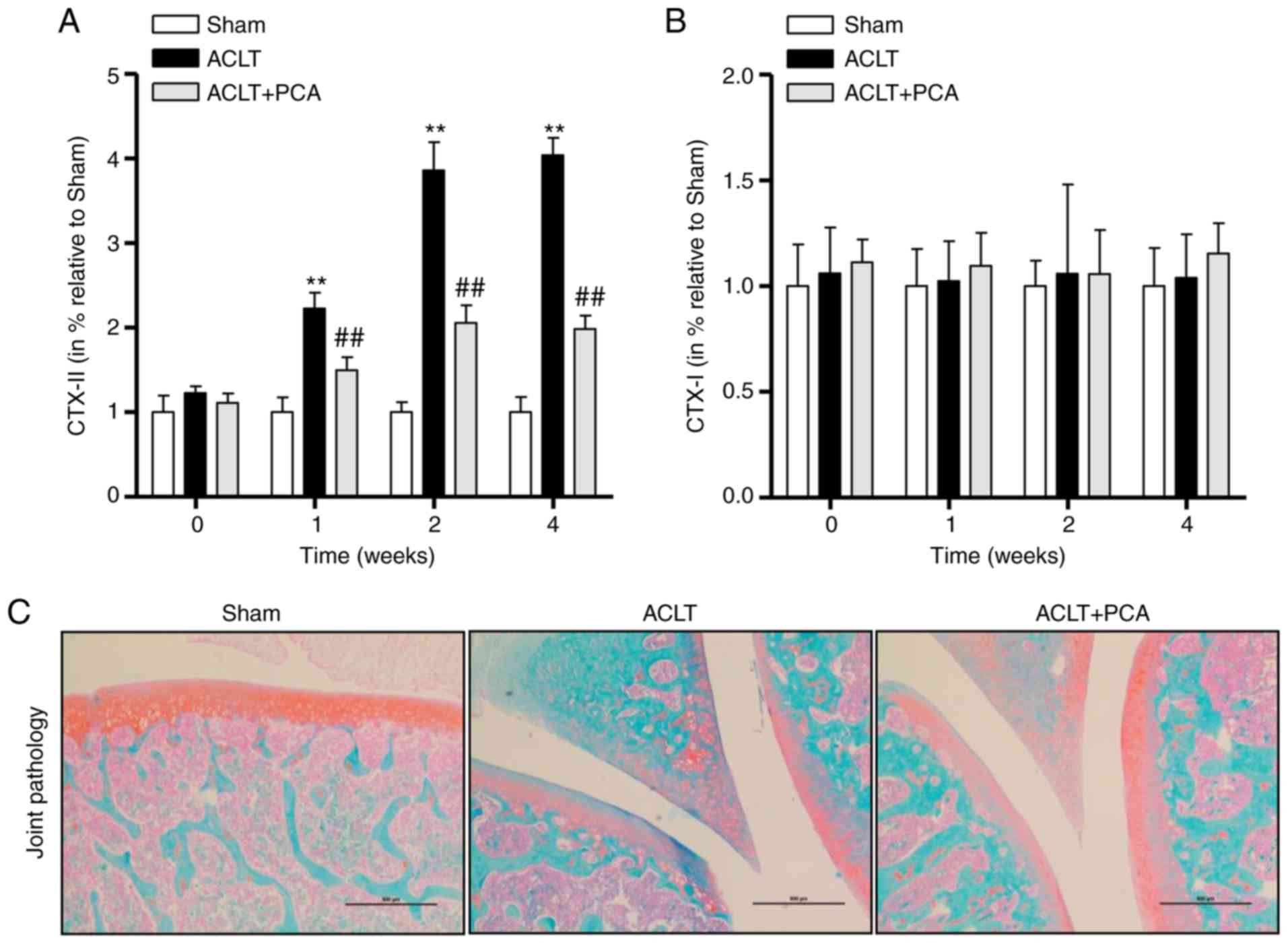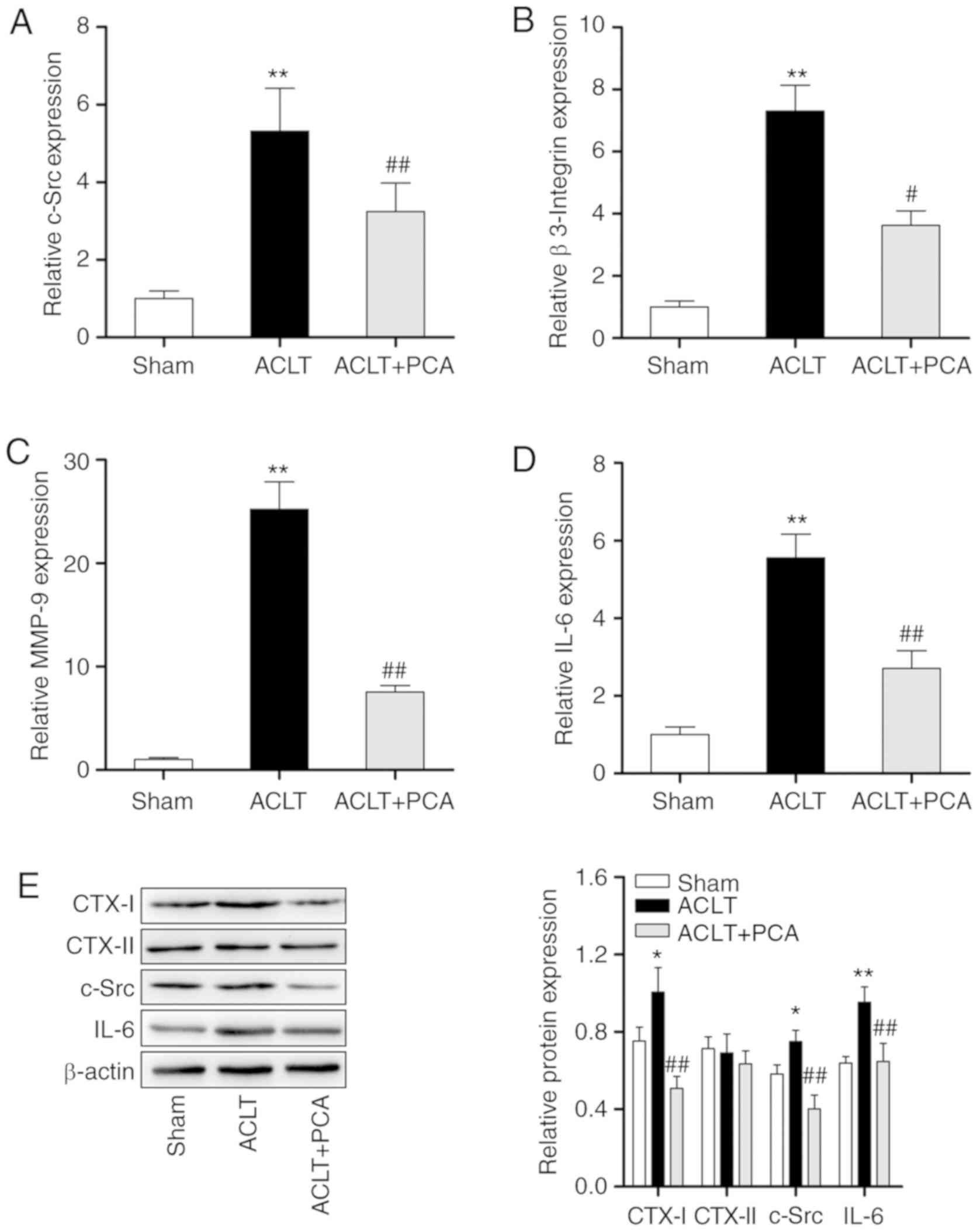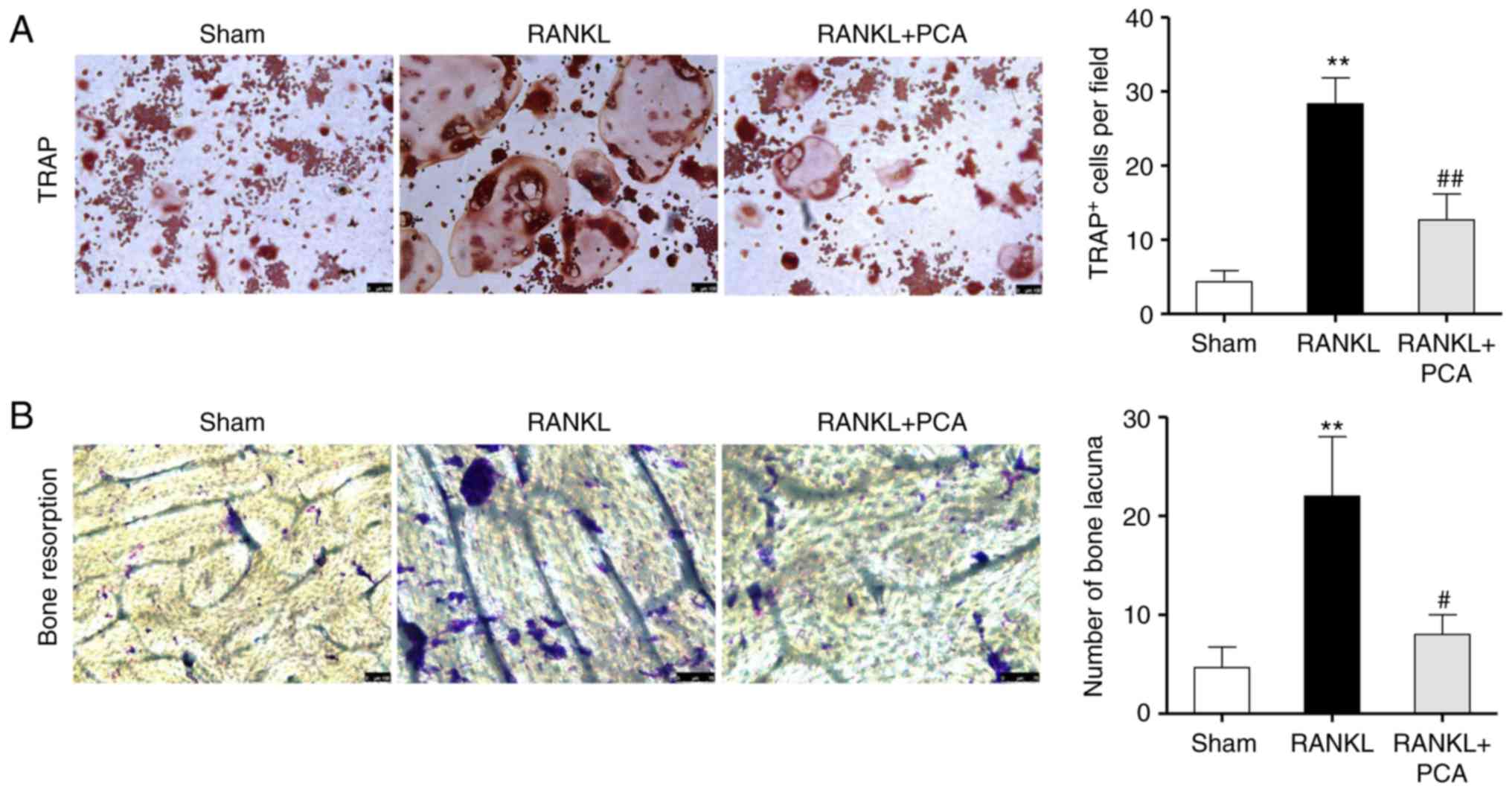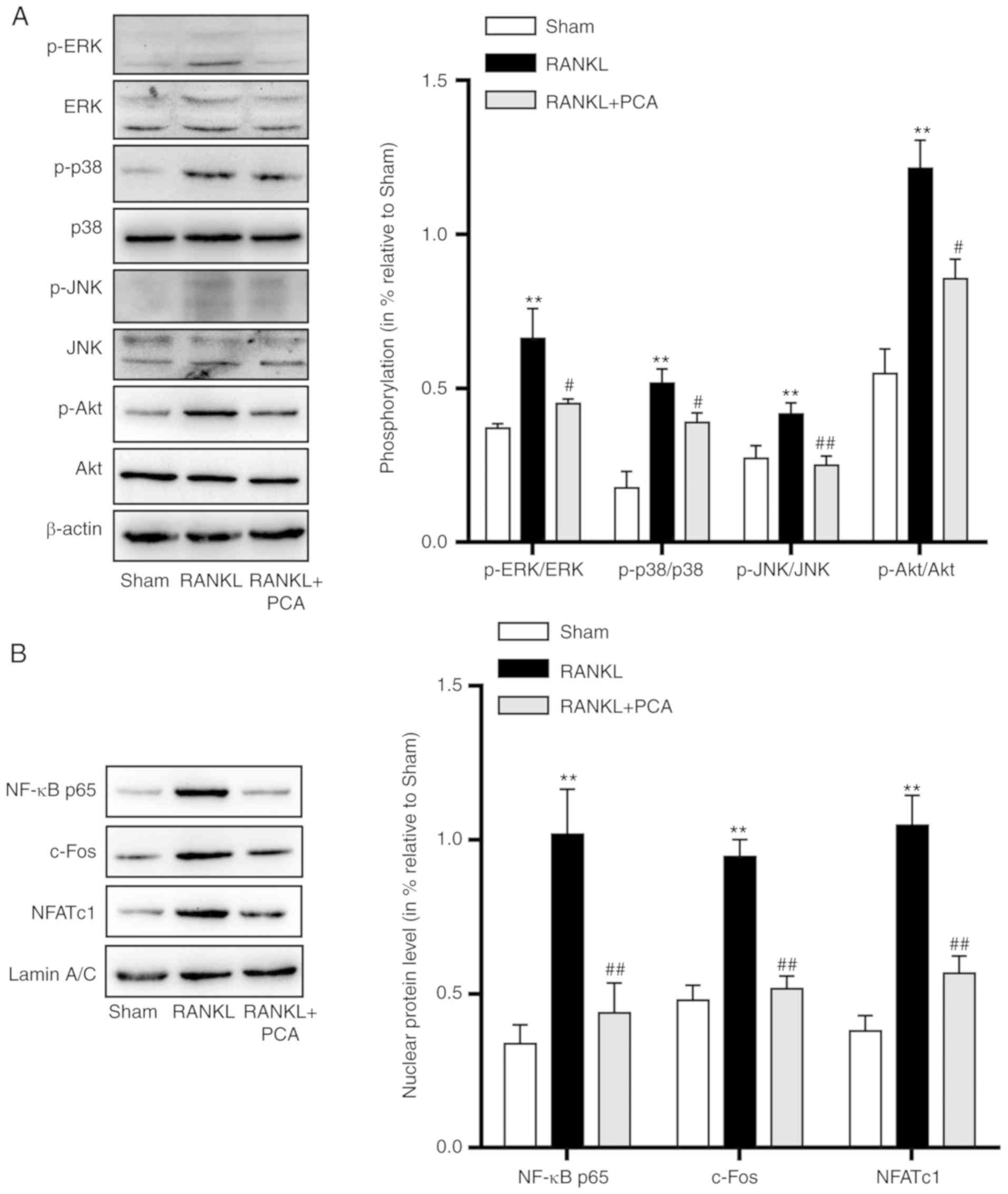|
1
|
Lluch Girbés E, Nijs J, Torres-Cueco R and
López Cubas C: Pain treatment for patients with osteoarthritis and
central sensitization. Phys Ther. 93:842–851. 2013. View Article : Google Scholar : PubMed/NCBI
|
|
2
|
Clouet J, Vinatier C, Merceron C,
Pot-vaucel M, Maugars Y, Weiss P, Grimandi G and Guicheux J: From
osteoarthritis treatments to future regenerative therapies for
cartilage. Drug Discov Today. 14:913–925. 2009. View Article : Google Scholar : PubMed/NCBI
|
|
3
|
Suri S and Walsh DA: Osteochondral
alterations in osteoarthritis. Bone. 51:204–211. 2012. View Article : Google Scholar : PubMed/NCBI
|
|
4
|
Boyle WJ, Simonet WS and Lacey DL:
Osteoclast differentiation and activation. Nature. 423:337–342.
2003. View Article : Google Scholar : PubMed/NCBI
|
|
5
|
Rodan GA and Martin TJ: Therapeutic
approaches to bone diseases. Science. 289:1508–1514. 2000.
View Article : Google Scholar : PubMed/NCBI
|
|
6
|
Koh YH, Hong SH, Kang HS, Chung CY, Koo
KH, Chung HW, Cha JH and Son KR: The effects of bone turnover rate
on subchondral trabecular bone structure and cartilage damage in
the osteoarthritis rat model. Rheumatol Int. 30:1165–1171. 2010.
View Article : Google Scholar : PubMed/NCBI
|
|
7
|
Strassle BW, Mark L, Leventhal L, Piesla
MJ, Jian Li X, Kennedy JD, Glasson SS and Whiteside GT: Inhibition
of osteoclasts prevents cartilage loss and pain in a rat model of
degenerative joint disease. Osteoarthritis Cartilage. 18:1319–1328.
2010. View Article : Google Scholar : PubMed/NCBI
|
|
8
|
Bagi CM, Berryman E, Zakur DE, Wilkie D
and Andresen CJ: Effect of antiresorptive and anabolic bone therapy
on development of osteoarthritis in a posttraumatic rat model of
OA. Arthritis Res Ther. 17:3152015. View Article : Google Scholar : PubMed/NCBI
|
|
9
|
Siebelt M, Waarsing JH, Groen HC, Müller
C, Koelewijn SJ, de Blois E, Verhaar JA, de Jong M and Weinans H:
Inhibited osteoclastic bone resorption through alendronate
treatment in rats reduces severe osteoarthritis progression. Bone.
66:163–170. 2014. View Article : Google Scholar : PubMed/NCBI
|
|
10
|
Zhao C, Liu Q and Wang K: Artesunate
attenuates ACLT-induced osteoarthritis by suppressing
osteoclastogenesis and aberrant angiogenesis. Biomed Pharmacother.
96:410–416. 2017. View Article : Google Scholar : PubMed/NCBI
|
|
11
|
Yasuda H, Shima N, Nakagawa N, Yamaguchi
K, Kinosaki M, Mochizuki S, Tomoyasu A, Yano K, Goto M, Murakami A,
et al: Osteoclast differentiation factor is a ligand for
osteoprotegerin/osteoclastogenesis-inhibitory factor and is
identical to TRANCE/RANKL. Proc Natl Acad Sci USA. 95:3597–3602.
1998. View Article : Google Scholar : PubMed/NCBI
|
|
12
|
Lacey DL, Timms E, Tan HL, Kelley MJ,
Dunstan CR, Burgess T, Elliott R, Colombero A, Elliott G, Scully S,
et al: Osteoprotegerin ligand is a cytokine that regulates
osteoclast differentiation and activation. Cell. 93:165–176. 1998.
View Article : Google Scholar : PubMed/NCBI
|
|
13
|
Zhao Q, Wang X, Liu Y, He A and Jia R:
NFATc1: Functions in osteoclasts. Int J Biochem Cell Biol.
42:576–579. 2010. View Article : Google Scholar : PubMed/NCBI
|
|
14
|
Takayanagi H, Kim S, Koga T, Nishina H,
Isshiki M, Yoshida H, Saiura A, Isobe M, Yokochi T, Inoue J, et al:
Induction and activation of the transcription factor NFATc1 (NFAT2)
integrate RANKL signaling in terminal differentiation of
osteoclasts. Dev Cell. 3:889–901. 2002. View Article : Google Scholar : PubMed/NCBI
|
|
15
|
Kakkar S and Bais S: A review on
protocatechuic acid and its pharmacological potential. ISRN
Pharmacol. 2014:9529432014. View Article : Google Scholar : PubMed/NCBI
|
|
16
|
Li XC, Wang XZ, Chen DF and Chen SZ:
Antioxidant activity and mechanism of protocatechuic acid in vitro.
Funct Foods Health Dis. 1:232–244. 2011.
|
|
17
|
Mahadevan N, Shival i and Kamboj P:
Hibiscus sabdariffa Linn.-An overview. Nat Prod Radiance. 8:77–83.
2009.
|
|
18
|
Tanaka T, Tanaka T and Tanaka M: Potential
cancer chemopreventive activity of protocatechuic acid. J Exp Clin
Med. 3:27–33. 2011. View Article : Google Scholar
|
|
19
|
Lende AB, Kshirsagar AD, Deshpande AD,
Muley MM, Patil RR, Bafna PA and Naik SR: Anti-inflammatory and
analgesic activity of protocatechuic acid in rats and mice.
Inflammopharmacology. 19:255–263. 2011. View Article : Google Scholar : PubMed/NCBI
|
|
20
|
Wu YX, Wu TY, Xu BB, Xu XY, Chen HG, Li XY
and Wang G: Protocatechuic acid inhibits osteoclast differentiation
and stimulates apoptosis in mature osteoclasts. Biomed
Pharmacother. 82:399–405. 2016. View Article : Google Scholar : PubMed/NCBI
|
|
21
|
Galois L, Etienne S, Grossin L,
Watrin-Pinzano A, Cournil-Henrionnet C, Loeuille D, Netter P,
Mainard D and Gillet P: Dose-response relationship for exercise on
severity of experimental osteoarthritis in rats: A pilot study.
Osteoarthritis Cartilage. 12:779–786. 2004. View Article : Google Scholar : PubMed/NCBI
|
|
22
|
Welberg LA, Kinkead B, Thrivikraman K,
Huerkamp MJ, Nemeroff CB and Plotsky PM:
Ketamine-xylazine-acepromazine anesthesia and postoperative
recovery in rats. J Am Assoc Lab Anim Sci. 45:13–20.
2006.PubMed/NCBI
|
|
23
|
Nyska M, Amir H, Porath A and Dekel S:
Radiological assessment of a modified anterior drawer test of the
ankle. Foot Ankle. 13:400–403. 1992. View Article : Google Scholar : PubMed/NCBI
|
|
24
|
Nielsen RH, Stoop R, Leeming DJ, Stolina
M, Qvist P, Christiansen C and Karsdal MA: Evaluation of cartilage
damage by measuring collagen degradation products in joint extracts
in a traumatic model of osteoarthritis. Biomarkers. 13:79–87. 2008.
View Article : Google Scholar : PubMed/NCBI
|
|
25
|
Zhang Z, Wei X, Gao J, Zhao Y, Zhao Y, Guo
L, Chen C, Duan Z, Li P and Wei L: Intra-Articular injection of
cross-linked hyaluronic acid-dexamethasone hydrogel attenuates
osteoarthritis: An experimental study in a rat model of
osteoarthritis. Int J Mol Sci. 17:4112016. View Article : Google Scholar : PubMed/NCBI
|
|
26
|
Livak KJ and Schmittgen TD: Analysis of
relative gene expression data using real-time quantitative PCR and
the 2(-Delta Delta C(T)) method. Methods. 25:402–408. 2001.
View Article : Google Scholar : PubMed/NCBI
|
|
27
|
Mau LP, Cheng WC, Chen JK, Shieh YS,
Cochran DL and Huang RY: Curcumin ameliorates alveolar bone
destruction of experimental periodontitis by modulating osteoclast
differentiation, activation and function. J Funct Foods.
22:243–256. 2016. View Article : Google Scholar
|
|
28
|
Lu SH, Huang RY and Chou TC: Magnolol
ameliorates ligature-induced periodontitis in rats and
osteoclastogenesis: In vivo and in vitro study. Evid Based
Complement Alternat Med. 2013:6340952013. View Article : Google Scholar : PubMed/NCBI
|
|
29
|
Woolf AD and Pfleger B: Burden of major
musculoskeletal conditions. Bull World Health Organ. 81:646–656.
2003.PubMed/NCBI
|
|
30
|
Farkouh ME, Greenberg JD, Jeger RV,
Ramanathan K, Verheugt FW, Chesebro JH, Kirshner H, Hochman JS, Lay
CL, Ruland S, et al: Cardiovascular outcomes in high risk patients
with osteoarthritis treated with ibuprofen, naproxen or
lumiracoxib. Ann Rheum Dis. 66:764–770. 2007. View Article : Google Scholar : PubMed/NCBI
|
|
31
|
Park SH, Kim JY, Cheon YH, Baek JM, Ahn
SJ, Yoon KH, Lee MS and Oh J: Protocatechuic acid attenuates
osteoclastogenesis by downregulating JNK/c-Fos/NFATc1 signaling and
prevents inflammatory bone loss in mice. Phytother Res. 30:604–612.
2016. View
Article : Google Scholar : PubMed/NCBI
|
|
32
|
Rousseau JC and Delmas PD: Biological
markers in osteoarthritis. Nat Clin Pract Rheumatol. 3:346–356.
2007. View Article : Google Scholar : PubMed/NCBI
|
|
33
|
Garnero P, Rousseau JC and Delmas PD:
Molecular basis and clinical use of biochemical markers of bone,
cartilage, and synovium in joint diseases. Arthritis Rheum.
43:953–968. 2000. View Article : Google Scholar : PubMed/NCBI
|
|
34
|
Garnero P, Piperno M, Gineyts E, Christgau
S, Delmas PD and Vignon E: Cross sectional evaluation of
biochemical markers of bone, cartilage, and synovial tissue
metabolism in patients with knee osteoarthritis: Relations with
disease activity and joint damage. Ann Rheum Dis. 60:619–626. 2001.
View Article : Google Scholar : PubMed/NCBI
|
|
35
|
Dong Z, Bonfil RD, Chinni S, Trindade
Filho JC, Bhagat S, Bhagat S, Fridman R and Cher ML: Enhanced
osteoclast motility due to overexpression of MMP-9 induced by
prostate cancer cells. Cancer Res. 64:773. 2004.PubMed/NCBI
|
|
36
|
Anderson DM, Maraskovsky E, Billingsley
WL, Dougall WC, Tometsko ME, Roux ER, Teepe MC, DuBose RF, Cosman D
and Galibert L: A homologue of the TNF receptor and its ligand
enhance T-cell growth and dendritic-cell function. Nature.
390:175–179. 1997. View
Article : Google Scholar : PubMed/NCBI
|
|
37
|
Hsu H, Lacey DL, Dunstan CR, Solovyev I,
Colombero A, Timms E, Tan HL, Elliott G, Kelley MJ, Sarosi I, et
al: Tumor necrosis factor receptor family member RANK mediates
osteoclast differentiation and activation induced by
osteoprotegerin ligand. Proc Natl Acad Sci USA. 96:3540–3545. 1999.
View Article : Google Scholar : PubMed/NCBI
|
|
38
|
Franzoso G, Carlson L, Xing L, Poljak L,
Shores EW, Brown KD, Leonardi A, Tran T, Boyce BF and Siebenlist U:
Requirement for NF-kappaB in osteoclast and B-cell development.
Genes Dev. 11:3482–3496. 1997. View Article : Google Scholar : PubMed/NCBI
|
|
39
|
Grigoriadis AE, Wang ZQ, Cecchini MG,
Hofstetter W, Felix R, Fleisch HA and Wagner EF: C-Fos: A key
regulator of osteoclast-macrophage lineage determination and bone
remodeling. Science. 266:443–448. 1994. View Article : Google Scholar : PubMed/NCBI
|
|
40
|
Lee ZH and Kim HH: Signal transduction by
receptor activator of nuclear factor kappa B in osteoclasts.
Biochem Biophys Res Commun. 305:211–214. 2003. View Article : Google Scholar : PubMed/NCBI
|
|
41
|
Wong BR, Besser D, Kim N, Arron JR,
Vologodskaia M, Hanafusa H and Choi Y: TRANCE, a TNF family member,
activates Akt/PKB through a signaling complex involving TRAF6 and
c-Src. Mol Cell. 4:1041–1049. 1999. View Article : Google Scholar : PubMed/NCBI
|
|
42
|
Kolbe L, Immeyer J, Batzer J, Wensorra U,
tom Dieck K, Mundt C, Wolber R, Stäb F, Schönrock U, Ceilley RI and
Wenck H: Anti-inflammatory efficacy of Licochalcone A: Correlation
of clinical potency and in vitro effects. Arch Dermatol Res.
298:23–30. 2006. View Article : Google Scholar : PubMed/NCBI
|
|
43
|
Shui C, Riggs BL and Khosla S: The
immunosuppressant rapamycin, alone or with transforming growth
factor-beta, enhances osteoclast differentiation of RAW264.7
monocyte-macrophage cells in the presence of RANK-ligand. Calcif
Tissue Int. 71:437–446. 2002. View Article : Google Scholar : PubMed/NCBI
|
|
44
|
Kim WS, Kim HJ, Lee ZH, Lee Y and Kim HH:
Apolipoprotein E inhibits osteoclast differentiation via regulation
of c-Fos, NFATc1 and NF-κB. Exp Cell Res. 319:436–446. 2013.
View Article : Google Scholar : PubMed/NCBI
|
|
45
|
Yamashita T, Yao Z, Li F, Zhang Q, Badell
IR, Schwarz EM, Takeshita S, Wagner EF, Noda M, Matsuo K, et al:
NF-kappaB p50 and p52 regulate receptor activator of NF-kappaB
ligand (RANKL) and tumor necrosis factor-induced osteoclast
precursor differentiation by activating c-Fos and NFATc1. J Biol
Chem. 282:18245–18253. 2007. View Article : Google Scholar : PubMed/NCBI
|
|
46
|
Takatsuna H, Asagiri M, Kubota T, Oka K,
Osada T, Sugiyama C, Saito H, Aoki K, Ohya K, Takayanagi H and
Umezawa K: Inhibition of RANKL-induced osteoclastogenesis by
(−)-DHMEQ, a novel NF-kappaB inhibitor, through downregulation of
NFATc1. J Bone Miner Res. 20:653–662. 2005. View Article : Google Scholar : PubMed/NCBI
|
|
47
|
Luo L, Wei Q, Liu L, Lin X, Lin C, Zheng
LI and Zhao J: Protocatechuic acid benefits proliferation and
phenotypic maintenance of rabbit articular chondrocytes: An study.
Exp Ther Med. 9:1865–1870. 2015. View Article : Google Scholar : PubMed/NCBI
|
|
48
|
Chin A, Yang Y, Chai L, Wong RW and Rabie
AB: Effects of medicinal herb salvia miltiorrhiza on osteoblastic
cells in vitro. J Orthop Res. 29:1059–1063. 2011. View Article : Google Scholar : PubMed/NCBI
|


















